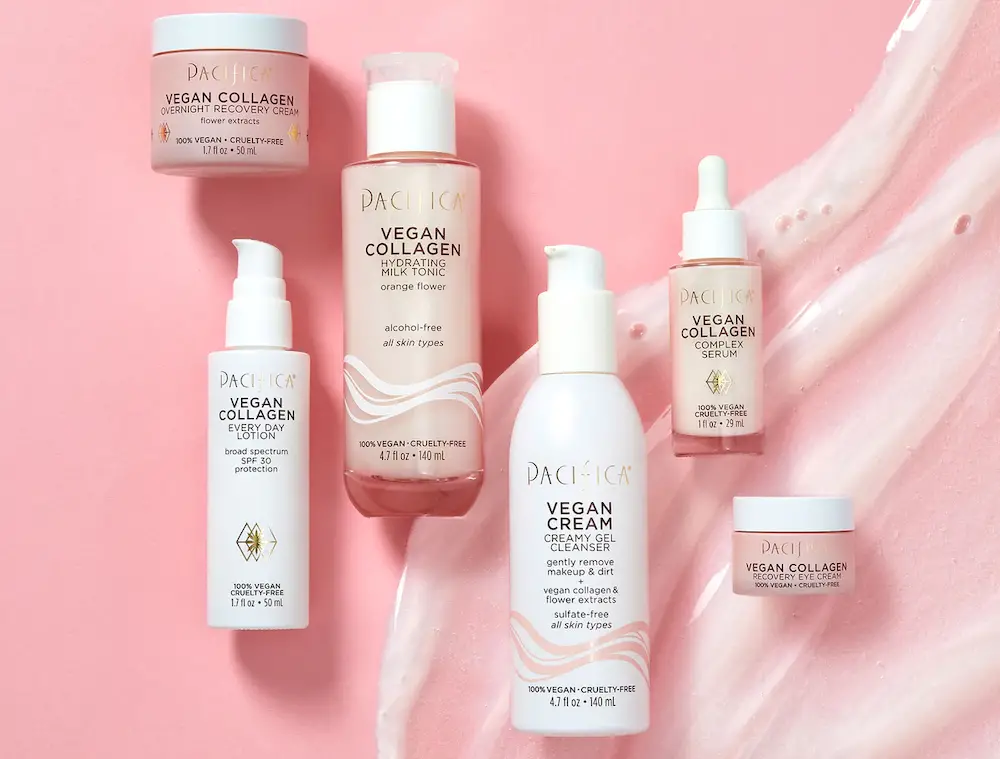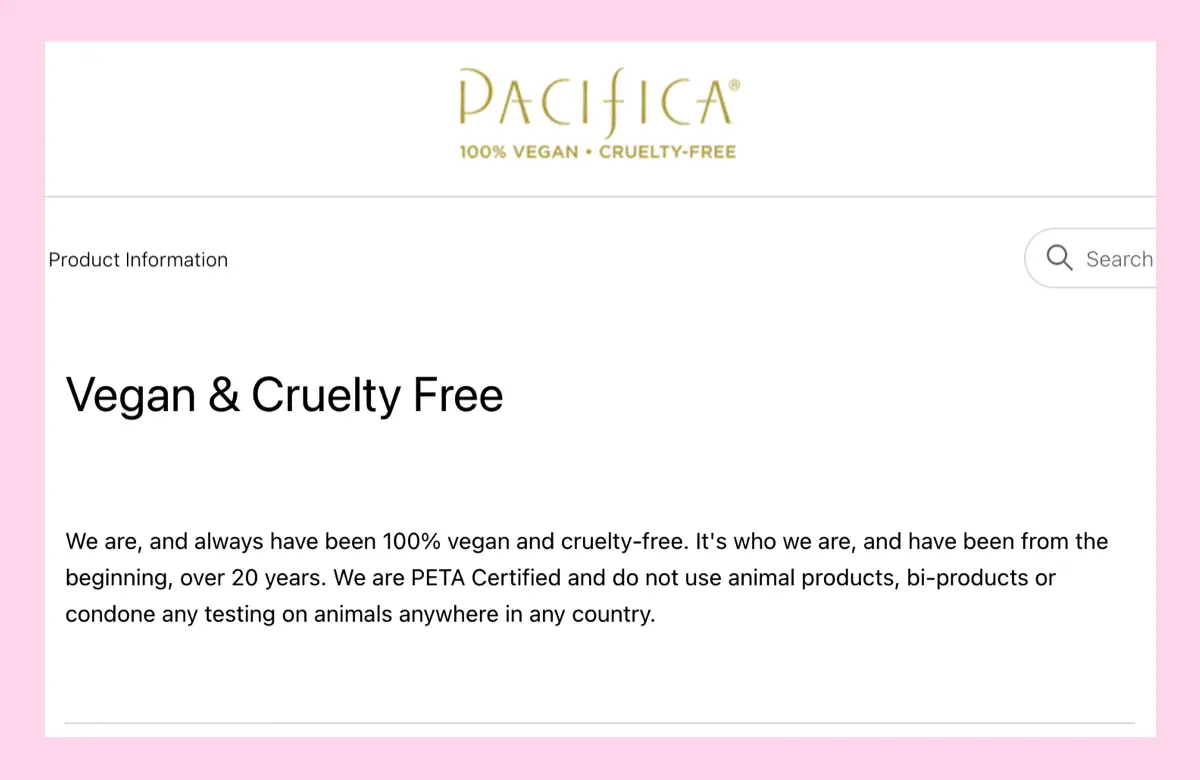Pacifica promises affordable, clean, ‘compassionate’ skincare and beauty products. With a decades-long history and tons of 5-star reviews from Pacifica fans, we want to know if they deliver on their promise. Are they actually cruelty-free and vegan?
Pacifica is cruelty-free. It doesn't conduct animal testing on its products, nor does it distribute its cosmetics where animal testing is required by law. Pacifica is also 100% vegan. It doesn't use any animal-derived ingredients.
If you believe that clean, cruelty-free, and vegan beauty should be available at an accessible price – so did the founder of Pacifica, Brook Harvey-Taylor!
Brook founded Pacifica with her husband Billy in 1996. The Portland, Oregon-born brand has now been at the forefront of making healthy, considerate, and accessible beauty for over 25 years.
You can understand why this brand has been such a hit, given it's fundamentally driven to do right by you.
Today, Pacifica has grown to offer skincare, cosmetics, haircare, and fragrances. The brand is situated in California and, according to Bloomberg, has an estimated net worth of $250 million.
Before deciding on what to buy, here's what you need to know about Pacifica's current animal testing policies, vegan ranges, formulation, and sustainability.
Is Pacifica Cruelty-Free and Vegan?
Pacifica is 100% Cruelty-Free
It does not:
It’s always a pleasure to talk about cruelty-free brands, but Pacifica restores our faith in humanity.
Pacifica has a solid cruelty-free message and is part of PETA’s Global Beauty Without Bunnies campaign. This means its products feature the PETA logo.
The brand is also independently owned, with private equity funding as investments. So we can guarantee it doesn’t have a parent company that allows animal testing.
This brings us to our next point:
Pacifica is Vegan
Pacifica is entirely vegan (and still affordable). It does not use any animal-derived ingredients in any of its products.
However, it's worth knowing that Pacifica is the exception and not the rule.
Most mainstream skincare brands are not 100% vegan. These are certain animal-derived ingredients to look out for in general:
If you're interested in their best vegan products or finding vegan brand alternatives – keep reading or click on this link: Pacifica vegan products.
Animal Testing Policy and History
Pacifica has always been committed to creating clean, effective, and affordable beauty that is also cruelty-free. This has been its intention since it was founded.
Cruelty-Free Status in 2022
Here is a screenshot of Pacifica's official statement regarding its cruelty-free policies and vegan products, taken from their website:
Certification
Pacifica is PETA certified, which is not a bad start. You are likely to find the little cruelty-free PETA bunny next to each one of its products.
However, it would be nice to see more certification from Pacifica since it’s a proudly cruelty-free brand.
While you might know PETA very well – it surprisingly doesn't hold the strictest cruelty-free regulations. It seems only to require a brand's written consent that abides by the PETA code of conduct.
Certification from Leaping Bunny is ideal because it holds rigorous standards and does regular audits to ensure they are upheld.
The Leaping Bunny association is very strict and reliable, which ensures that:
If you see a bunny stamp on the back of your product bottle – that's an excellent sign. But don't let the image itself fool you. A lot of brands are using fake logos to deceive consumers.
Do your homework and see which products are genuinely cruelty-free first. This article will help you: Which Cruelty-Free Logos Can You Trust?
Is Pacifica Sold Where Animal Testing is Required By Law?
Pacifica does not distribute any of its products to retail stores in mainland China or any country that requires animal testing on cosmetics by law.
China has a shocking track record. It is the country with the most animal testing globally, with over 20 million animals used per year.
Almost all Pacifica products are manufactured in the USA, except for their eye pencils, a few palettes, and sample bag items. Products not made in the USA list their country of origin.
If Pacifica manufactures anything in China, rest assured that those items would not be tested on animals.
This law is purely enforced on international cosmetic products entering China and not on products being made within the country itself.
However, if you live in China or are concerned about its cruel beauty policies, there are a couple of loopholes. Here's how to find cruelty-free cosmetics in China: Are Cosmetics Made in China Cruelty-Free?What Pacifica Products Are Vegan?
Pacifica has an extensive range of beautifully packaged vegan products that continues to grow. It prides itself in developing a product with you (the consumer) and the planet in mind.
To save you some time, here are some of its most popular skincare and cosmetics products:You can find a complete list of Pacifica’s vegan products on their website.
Vegan Alternatives to Pacifica
Pacifica has some great vegan options that are well-priced and relatively accessible.
We like what they stand for and cheer on this multi-million dollar brand for its ethical approach to cosmetic developments.
Pacifica is 100% cruelty-free and vegan, and users give it great reviews.
But if the brand is not easily accessible to you, or if you’re looking for more sustainable and natural products, here are some alternatives we recommend:
Is Pacifica Natural and Organic?
Pacifica is not natural or organic, and it doesn’t claim to be. However, it does use safe and clean ingredients in all of its formulas.
One thing we can attest to is that their selection of ingredients is still much safer and more natural than most brands in a similar price range.
Clean vs. Natural Ingredients
The term "natural" is not regulated for cosmetics and skincare. In other words, it doesn't hold one specific meaning.
Usually, it means a product is free of certain more toxic synthetic ingredients, including parabens, phthalates, sulfates, and more. But people also interpret "natural" to mean ingredients of immediate plant origin.
Here's the thing: "natural" is not always good. Just because an ingredient is natural doesn't mean you should rub it on your skin. Poison ivy is natural – but we wouldn't recommend rolling in a field of that stuff!
All products use a certain amount of synthetic ingredients in their formulas, and Pacifica is no exception – but it can choose to use better or clean synthetics.
If a synthetic ingredient is "clean," it is safe and non-toxic for us. Its purpose is to preserve the stability of a beauty formulation.
A few naturally-derived ingredients Pacifica uses to enhance its cosmetics include:
Does Pacifica Use Safe Ingredients?
According to Skin Safe, Pacifica has an 82- 91% allergen-free ranking across 238 products.
Reading the ingredient list is crucial because Pacifica is not 100% hypoallergenic or non-comedogenic, and they do not claim to be.
Certain products are specifically for these concerns, so make sure you buy what your skin needsThe EU/UK Have Stricter Ingredient Regulations
As a conscientious shopper, you must read up on any brand's ingredient list before you make a purchase – especially if you live within the United States.
This is because the FDA has only banned or restricted 11 harmful chemicals from cosmetics within the country. Europe and the UK, on the other hand, have banned 1,328!
Although Pacifica is dedicated to making clean cosmetics – it’s always worth being cautious.
With skincare and cosmetics, you want to avoid these ingredients:
Are Cruelty-Free Ingredients Safe?
If you're worried about how safe it is to use cosmetics not tested on animals – please relax and take a sigh of relief.
There is no reason why cruelty-free products shouldn't be just as safe as anything tested on an animal.
Not only is it easy to test ingredients without using animals altogether, but there are so many pre-approved ingredients you can use to make cosmetics that there really is no need.
If you're interested, here's more on the subject: Are Cruelty-Free Cosmetics Safe?
Is Pacifica Sustainable and Ethical?
Pacifica uses language that would have us believe it’s an ethical and sustainable brand, in addition to its cruelty-free and vegan status.
While they are pretty environmentally conscious – there’s not enough information to tell us how ethical the brand really is.
It's no secret that the world has a huge waste problem, and cosmetic brands are only making it worse by using unsustainable packaging and harmful ingredients.
Some of the ways Pacifica takes environmental accountability are by:Certain other ways Pacifica could take strong environmental accountability is by:
Final Thoughts
Pacifica states that its “made with compassion, for the planet, for animals, and you.”
For a sustainable future to happen, big brands need to start owning their responsibility to the environment instead of passing the buck onto their customers and followers.
We appreciate that it is an accessible and affordable brand, as high costs and difficult-to-find products are barriers to veganism and healthy living.
However, we can’t help but be left feeling like Pacifica could be doing more to earn the “made with compassion for the planet” claim on their homepage.
If you agree, Pacifica might not be the best choice for activists like you. If you’d like to take the time to voice your concerns to Pacifica, we might see them make changes for the better.


